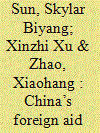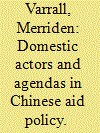| Srl | Item |
| 1 |
ID:
154794


|
|
|
|
|
| Summary/Abstract |
China’s rise as a (re)emerging donor has attracted attention over the last decade, with a focus on Chinese development assistance as a challenge to the Organisation for Economic Cooperation and Development (OECD) aid norms. Knowledge of China’s domestic aid structure is needed to understand Chinese aid abroad. This paper addresses gaps in the literature and challenges the accepted nostrum that China’s Ministry of Commerce (MOFCOM) dominates China’s aid programme. Building on the authors’ experience as Chinese aid practitioners and scholars over more than a decade and drawing on over 300 interviews, the paper explores China’s aid decision-making processes by examining the main agencies, identities and informal interactions. We argue that the Chinese aid system is characterised by fierce and ongoing competition for influence among actors, especially MOFCOM, the Ministry of Foreign Affairs (MFA) and the Ministry of Finance (MoF), as well as the companies responsible for implementing Chinese aid projects.
|
|
|
|
|
|
|
|
|
|
|
|
|
|
|
|
| 2 |
ID:
178386


|
|
|
|
|
| Summary/Abstract |
Since the 1990s, China has formalized its short-term foreign aid training for foreign officials and technological personnel. This type of training often lasts for 21 days and participants from invited countries arrive in China for a period of condensed study, with all fees covered by the Chinese government. By the end of 2009, China had organized more than 4000 short-term training programs for over 120,000 personnel from more than 50 countries. Along with the establishment of the Twelfth Five-Year Plan and the constructional needs of the Belt and Road Initiative, China has gradually increased the export of its cultural products in foreign aid training. Surprisingly, such national-scale training is largely omitted from current scholarly research. Employing the “fragmented authoritarianism” model, we look at the administrative structure of China’s foreign aid training and provide rudimentary research into the field.
|
|
|
|
|
|
|
|
|
|
|
|
|
|
|
|
| 3 |
ID:
143629


|
|
|
|
|
| Summary/Abstract |
As China's aid has increased, so has scrutiny by the international development and foreign policy community. Despite recognition that foreign aid policy is a result of domestic political contests, the existing literature tends to overlook Chinese debates about the purpose of aid, and how that purpose should be achieved. This paper argues that examining these debates shows that Chinese aid is not a well-considered element of an overarching strategy. Rather, where foreign aid is considered relevant vis-à-vis China's goals, its use is hotly contested. Competing actors' varying agendas, rather than any coherent strategy, underpin inchoate aid projects.
|
|
|
|
|
|
|
|
|
|
|
|
|
|
|
|
| 4 |
ID:
110197


|
|
|
|
|
| Publication |
2011.
|
| Summary/Abstract |
It has long been recognised that the actors involved in crafting
and implementing China's foreign policy are not always in agreement.
This paper argues that the prioritisation of commercial outreach over
purely political objectives in Africa has led to a shift in influence from
the Ministry of Foreign Affairs (MFA) to the Ministry of Commerce
(MOFCOM). To that end, the paper examines the rising prominence of
China Exim Bank's concessional loans as a foreign policy instrument in
Africa along with the process through which they are negotiated and
implemented. Using the case of Angola, this paper shows how despite
formal institutional equality, the MOFCOM is playing a far more influential role than the MFA is in defining the direction of China's foreign
policy toward Africa.
|
|
|
|
|
|
|
|
|
|
|
|
|
|
|
|